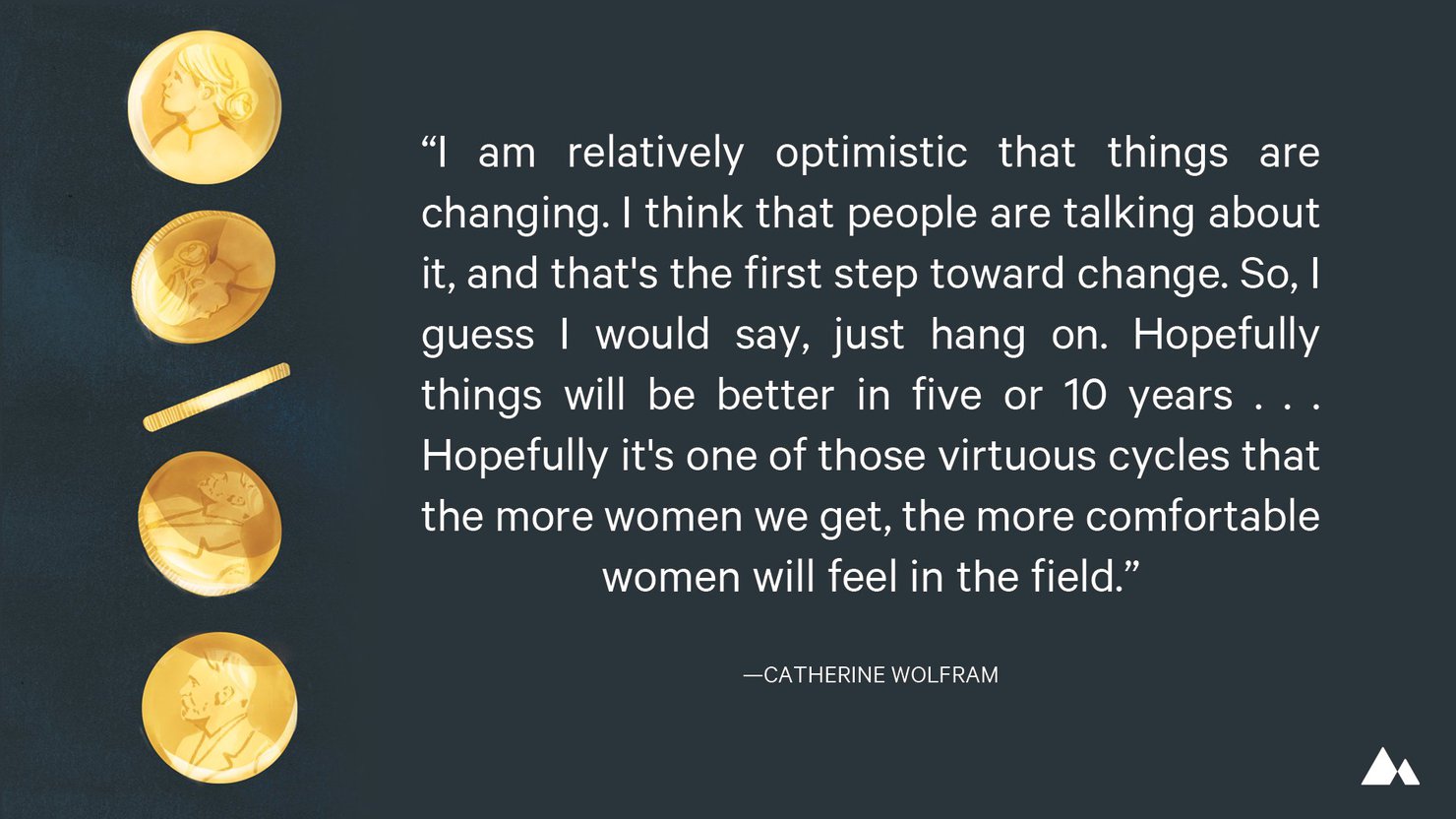Last year, Esther Duflo became the second woman, and the youngest person, to win the Nobel Prize in Economics (formally known as the Sveriges Riksbank Prize in Economic Sciences in Memory of Alfred Nobel). She shares the prize with Abhijit Banerjee and Michael Kremer; the three collaborate often and received the award for their experimental approach to alleviating global poverty using randomized controlled trials.
Catherine Wolfram, a university fellow with Resources for the Future (RFF), also relies on randomized controlled trials in some of her research—in her case, studying energy policy in both developed and developing countries. Thus, Wolfram is well-placed to comment on the significance of last year’s Nobel and share thoughts about being one of the mere 15 percent of economists who are working as full professors in the United States and who also happen to be women. The following Q&A is a condensed and edited version of a recent related conversation with Wolfram.
Resources magazine: Were you surprised that randomized controlled trials were the focus of this year’s Nobel Prize in Economics?
Catherine Wolfram: Honestly, I hadn’t been paying that much attention, but after the fact, it's a phenomenal choice. I think they [Esther Duflo, Abhijit Banerjee, and Michael Kremer] really transformed not just the way development economics has worked, but in general, the way people are thinking about empirical economics.
Why do you think randomized controlled trials became so pervasive and important in the past 20 years?
Over that same time period, or maybe even 25 or 30 years ago, economists were starting what’s called the credibility revolution—thinking harder and harder about how to establish causality.
To use an energy example based on some of the work I’m doing, there’s a very strong correlation at the country level between electricity consumption per capita and GDP [gross domestic product] per capita. But we don't really know whether GDP growth leads to more electricity consumption. Maybe as people get richer, they have the income to be able to buy things like refrigerators, and then eventually air conditioners. That would be a GDP-causes-electrification explanation.
But maybe electrification causes GDP growth—with more electricity per capita, you literally have the physical means to make things and to have a big manufacturing sector. That's the electricity-causes-GDP explanation. We don’t really know which explanation is correct, and it's really important to figure out whether Y causes X, or X causes Y.
Can you briefly describe how a randomized controlled trial works? How does it establish causality better than other methods?
The key behind establishing causality is to establish a counterfactual—to establish what would have happened, but for the treatment. Let’s start with a medical example, where the treatment is usually a new drug.
With a randomized controlled trial, say you have a population of 1,000 people. You flip a coin and allocate heads into the control group, and tails into the treatment group. The control group gets the placebo, and the treatment group gets the drug. Because of randomization, everything about those two different groups is statistically the same, so you’re doing a true apples-to-apples comparison. Potential differences among people, like average age, health status, propensity to exercise, diet, hours of sleep, stress, anxiety—all these things can be hard to measure. But because of the law of averages, they all should be statistically identical between the two groups. Because every single person had an equal chance of being either in the treatment group or the control group, then the only difference is that the treatment group got the drug, and the control group got the placebo.

It’s not a simple extension to economics, because we're not talking about treatments where you can just sit there and watch whether the person takes the drug or not—we’re talking about social programs, and things where people have to agree to participate. So, there's a reason that [Duflo, Banerjee, and Kremer] won the Nobel Prize for extending randomized controlled trials into a field like economics, where there are much more complicated treatments at work.
How did you start incorporating randomized controlled trials into your own research?
In general, I guess I got a little bit frustrated with the methods that people had been using to establish causality. There are methods called difference in differences, where you’re praying to the causality gods that you got it right—that the group you're claiming is the control group is actually similar to the treatment group.
So, running a randomized controlled trial—it’s just beautiful that you're able to establish causality purely by the way you design the experiment.
How have randomized controlled trials influenced environmental economics?
One example in the United States is a recent paper that’s tackling environmental justice. Some early work suggested that maybe low-income and minority communities were more likely to experience pollution, kind of by choice: people were making the trade-off for good schools versus bad pollution. They were willing to experience high pollution because they could get some other amenity with it. It’s an explanation that’s consistent with the way economists like to view the world—that there's this big market, and everyone's making these rational cost-benefit calculations.
But this recent paper found that, particularly in low-pollution areas, renters with names that were clearly black and Latinx did not get responses to their inquiries for housing. Basically, the research showed that it's not this kind of rational cost-benefit calculus that people are making—there’s discrimination in the housing market, and that's part of why black and Latinx and low-income people are more likely to be living near pollution. They're literally only getting responded to for housing in areas that are more polluted.
For a lot of papers related to the environment, they’re looking at the health effects of pollution. But it's hard to think about randomly manipulating the amount of pollution. So, I think for some reasons, environmental economics has been one of the later fields to see randomized controlled trials used extensively. But people are getting more and more creative in finding ways to answer environmental questions with randomized controlled trials.
It’s been acknowledged that randomized controlled trials don’t always work so well, but when they do, they can be brilliant and amazing. Can you talk about what works well, and what proves to be too difficult, when you’re using randomized controlled trials?
People argue that randomized controlled trials are not good at capturing spillover effects. In other words, you’re looking at this treatment in a particular group, but what if people close to the treatment group were also impacted? I think that’s a bit of a red herring, because there are ways to address this problem with a well-designed randomized controlled trial. If you think spillovers are important, then you can usually capture them.
And, as I said earlier, there are definitely things that are harder to manipulate, like pollution. You can’t really randomly manipulate pollution—it would be politically and ethically challenging. One example that I’ve done is a randomized controlled trial on rural electrification in Kenya. Before that, there really hadn’t been that much development economics work using randomized controlled trials to study questions in the energy sector. I think it’s because of the big infrastructure investments—it’s hard to think about how to randomize those. But I think people have gotten more creative and have been able to address some of the critiques.
I think the biggest thing is that you can’t answer the more macro-oriented questions. Randomized controlled trials are not being used to study things like how changing the interest rate affects the overall economy; you just can’t randomly change interest rates. So, in general, there’s a limited scope, and randomized controlled trials are better for more micro-level questions. Essentially, there’s a risk that we’re looking under the lamp post—that we’re going to be doing a lot of randomized controlled trials around things that are easy to manipulate, and not other important questions.

If a young economist is interested in making the largest possible impact with their research, how would you say they should choose their study system or their methods?
I guess it depends on what you mean by maximizing impact. I’ve often thought about the difference between medicine, for instance, and economics. In medicine, if you become a doctor, you’re very clearly having a profound impact on people’s lives, but just not that many of them. Whereas if you go into economics and try to argue for a carbon tax, you would potentially have a massive impact on billions of people's lives if you could get the policy enacted. But the chances of getting it enacted are really slim.
It just depends on whether you’d rather be sure that you could help a wastewater treatment plant get built in your city, for example, or whether you'd rather have some small part to play in influencing the discussions about climate change. So, it depends on whether you prefer the doctor model, or what I would characterize as the economist model.
Do you have other general advice that you would give a young economist who’s coming up in the field today?
I would just say, pick something that you’re passionate about, because it’s great to wake up in the morning and be excited by what you're going to be spending your day on.
Do you think that advice would differ for an economist who also happens to be a woman?
Esther Duflo has been very critical of sexism in the field, and I agree 100 percent with the way she’s characterized it. Historically, there has been this kind of macho, locker-room atmosphere, especially in seminars. On the job market, for instance, you're presenting what you’ve spent years working on; people then try to suggest that it’s either not interesting, not right, or that you’ve done something wrong. So it can be really disheartening. I went to a seminar once that was joint with a discipline outside of economics. The economists started asking what I thought were some pretty benign questions of the job market candidate. The people in the audience from the school of social work turned to the economists and said, "Jeez, leave him alone. You're being so mean." So it just reminded me that there are different seminar cultures, and the culture in economics is particularly aggressive. And hopefully changing.
I was at an environmental economics conference recently, and it was really noticeable to me how constructive the questions were—there are just different ways of asking questions. One is, "You idiot, why didn’t you think of X, Y, or Z?" And another is to say, "This is really interesting. It might be even more interesting to think about X, Y, or Z." So, a lot of it is just common courtesy and culture.
I am relatively optimistic that things are changing. I think that people are talking about it, and that’s the first step toward change. So, I guess I would say, just hang on. Hopefully things will be better in five or 10 years. I do think having more women around is just more comforting. You don't feel like such an outsider. You don't have the experience of being the only woman in the seminar room if there are more women in the field. Hopefully it's one of those virtuous cycles that the more women we get, the more comfortable women will feel in the field.
The field will be that much better off by having more women, because we won't lose them to statistics, or engineering, or finance, or whatever they're doing instead. Culturally, women are encouraged to think about different things, so maybe we'll broaden the set of topics studied in the field. But I think the first-order effect is that we'll retain the smart, creative women in this field and not lose them to other fields.
And I guess that the suggestion to find something that you're passionate about is even more relevant to women, because there will be days where you're subject to some kind of sexism, and you’ve just got to remind yourself why you love what you're doing and why it's important. Walk beyond that and keep going.







